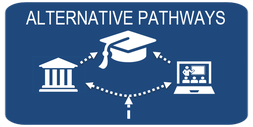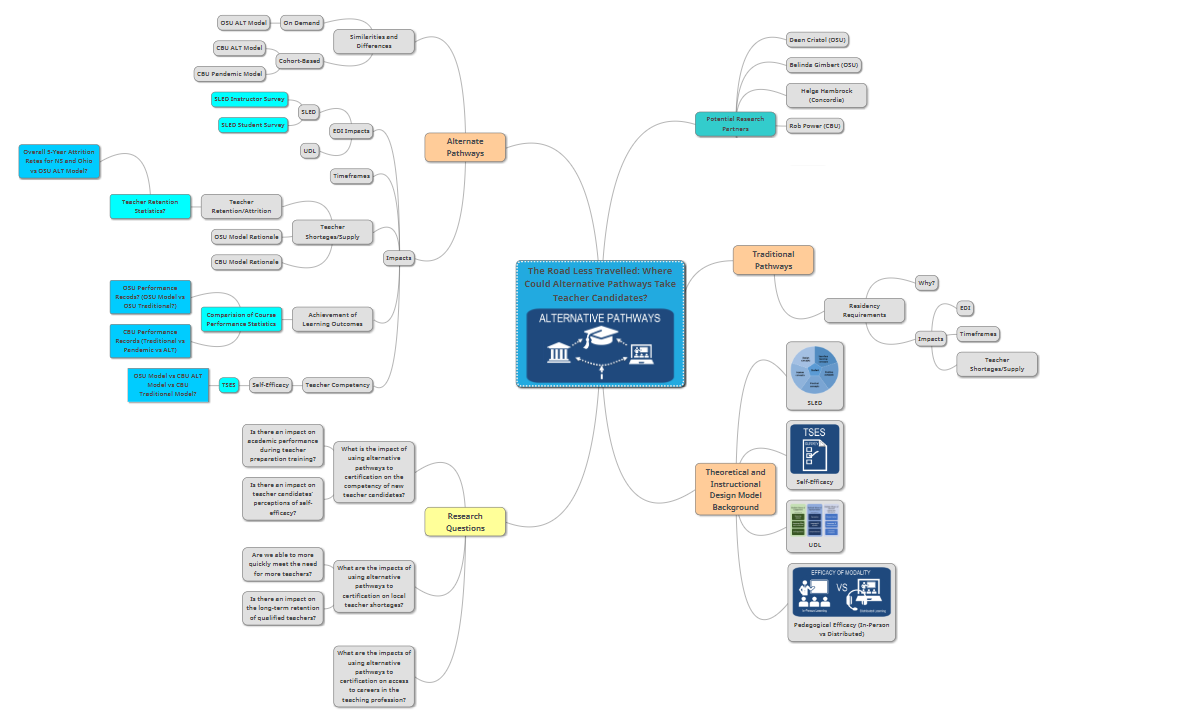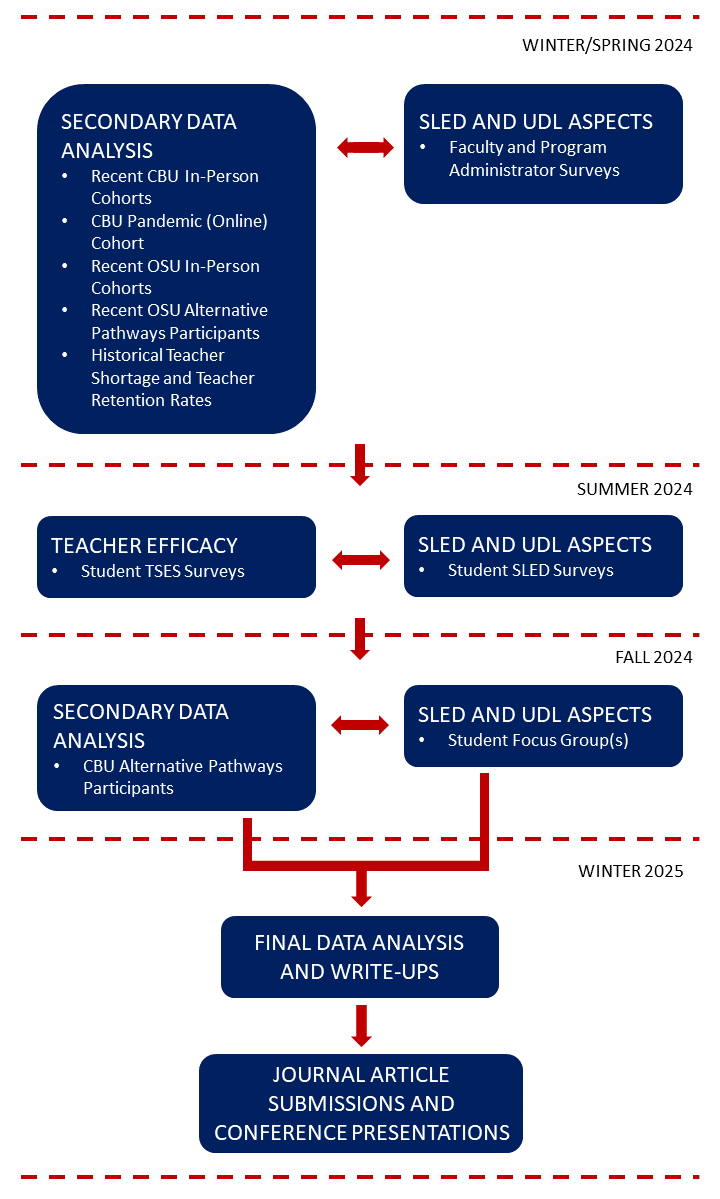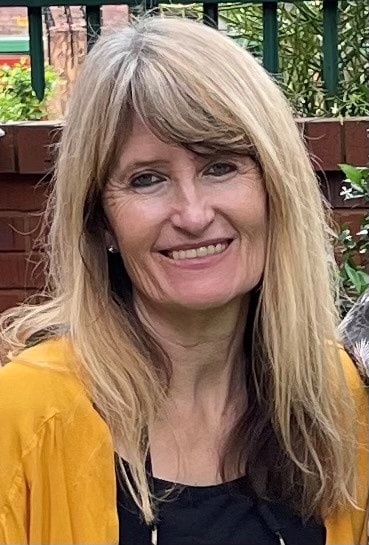Research Problem
In 2023, Cape Breton University (CBU) and the Province of Nova Scotia announced a new accelerated online Bachelor of Education program (Cape Breton University, 2023a; Pottie, 2023). The aim of this intensive program is to help alleviate the province's current classroom teacher shortages. The introduction of this alternative pathway at CBU mirrors the rationale for the introduction of the Intensive Pedagogical Training Institute (IPTI) and the Alternative Resident Educator Institute (AREI) initiatives at Ohio State University (OSU) (Ohio State University, n.d.) in the United States in 2007, when OSU received a grant from the US Department of Education’s Transition to Teaching Program to “recruit, train, and retain nontraditional teachers, as well as to expand nontraditional pathways to teaching in high-need and hard to staff school systems” (Ohio State University, 2007).
The underlying question to be explored by this research is one of how alternative pathways to teacher preparation would impact the readiness of candidates to take on roles as teachers in K12 schools. This research aims to examine the impacts of the use of alternative pathways to teacher-preparation on the experiences of teacher candidates, as well as on the perceived needs of the local regulatory agencies that oversee teacher training programs. This will include exploring the accessibility, equity and seamlessness of the learning experiences, through the lenses of UDL (CAST, 2022a, b) and the Seamless Learning Education Design (SLED) framework (Hambrock et al., 2020, 2022). It will also examine the impacts of the alternative pathway formats on the performances of candidates in achieving core program learning outcomes, on meeting local teacher supply demands, and on retention of qualified teachers within the K12 system. Finally, it will examine the impacts of the alternative pathway formats on graduating candidates’ perceptions of self-efficacy as teaching professionals (Tschannen-Moran & Woolfolk Hoy, 2001a, b). The foundations of this research are highlighted in the Conceptual Framework presented in Figure 1.
Conceptual Framework
View larger version online at https://drive.google.com/file/d/1OcRQ7ce1I1HBe0oJDRMezhYdEc3mFZtz/view?usp=sharing
Research Questions
1. What is the impact of using alternative pathways to certification on the competency of new teacher candidates?
- Is there an impact on academic performance during teacher preparation training?
- Is there an impact on teacher candidates' perceptions of self-efficacy?
- Are we able to more quickly meet the need for more teachers?
- Is there an impact on the long-term retention of qualified teachers?
Significance of the Research
This research aims to examine the viability of alternative pathways to teacher preparation on meeting perceived needs for qualified teachers for K12 schools. It aims to answer questions about the ability of such programs to graduate competent teachers, as well as to meet the needs of potential teacher candidates who might not be able to pursue traditional, residency-based programs of study.
Research Timelines
The phases and components of the proposed research study are presented in Figure 2.
Detailed Research Proposal (Concept Document)
Research Team
|
Dr. Rob Power
Assistant Professor, Education, Cape Breton University, Canada Dr. Rob Power is currently an Assistant Professor of Education at Cape Breton University. He has an extensive background in educational technology integration and instructional design for online and blended learning in K12, post-secondary, and workplace training contexts. Dr. Power has worked as an instructional design consultant and as the Leader of the Online Learning team with the Fraser Health Authority in British Columbia, Canada. He has also served in leadership roles with the International Association for Mobile Learning (IAmLearn) and the Canadian Network for Innovation in Education (CNIE). Dr. Power is also a founding member of the Pedagogy, Education and Technology Lab (PETL) and the International Research Network for Innovative Sustainable and Seamless Learning (IRN-ISSE), and president of Power Learning Solutions. |
|
Dr. Dean Cristol
Associate Professor, Education, Ohio State University, USA Dr. Dean Cristol is an Associate Professor of Education. He is a Member of the Executive Committee for the International Association for Mobile Learning and an Associate Editor for the Theory Into Practice Journal. His recent publications include “What it means to be a citizen in the internet age: Development of a reliable and valid digital citizenship scale”, Computers and Education (2017); “Evaluate and Optimize Learning Professional Development”, International Review of Research in Open and Distributed Learning (2016). “Mobile technology in K-12 environments”, Chapter in Handbook of Mobile Teaching and Learning, (Springer 2015); “Academic Achievement in BYOD Classrooms”, Journal of Applied Learning Technology, (2014). |
|
Dr. Belinda Gimbert
Associate Professor, Education, Ohio State University, USA Belinda Gimbert, PhD, is an associate professor, Educational Administration, Department of Educational Studies, The Ohio State University. Her research addresses strategic management of human resources in chronically, low performing and hard to staff urban and rural school systems. Gimbert teaches course related to strategic management of human capital/talent management, introduction to educational administration, and K-12 supervision. She taught mathematics and computing science for fifteen years in secondary schools (Grades 7-12) in rural New South Wales, Australia and administered in Human Resources and Staff Development with Newport News Public Schools, VA. Dr. Gimbert led Project KNOTtT (2007-2013) that hired and retained about 560 new teachers. She was the principal investigator for Mobilizing National Educator Talent (2011-2017), a partnership of colleges/universities and school districts in 12 states, The District of Columbia and Puerto Rico that transitioned 1,656 teachers to full state certification, while addressing the national issue of teacher quality. Currently, Dr. Gimbert is the project director/PI for two national project, Educators and Families for English Language Learners (2017-2022) and Helping English Learners and Partners Excel with Research-based Practices and Support (2021-2026) that partner with public and charter schools in The District of Columbia, Columbus City Schools (OH), NOBLE Academy (OH), the Harris County Department of Education (TX), and University of Puerto Rico, Mayaguez and is sponsored by U.S. ED’s Office of English Language Acquisition. |
|
Dr. Helga Hambrock
Adjunct Professor, Education/Senior Instructional Designer, Concordia University Chicago, USA Dr. Helga Hambrock is an Adjunct Professor of Educational Technology and Instructional Design for Masters and PhD students. She also works as a Senior Instructional Designer at the Concordia University in Chicago. She serves as chair for PhD committees as well as reviewer and external examiner for international universities. Her passion lies in the improvement of education by utilizing technologies and methodologies, with a specific focus on mobile and seamless learning. During the year of completing her PhD studies in South Africa in 2016, on the use of smartphones by students in and out of class, she moved to the USA and settled in Chicago. Over the past years her interest in global collaboration has grown to address common challenges and to find common solutions in the field of education. She joined the International Association for Mobile learning (IAmLearn) in 2016 and was on the EXCO as member at large for two years and as Vice President from 2018 to 2020. Dr. Hambrock initiated the first Global Research Project for IAmLearn in 2018 and subsequently the first book was published in 2020. Over the past years, she presented papers at numerous conferences, lead conference workshops and published articles and book chapters. She also received several invitations to present at international conferences as keynote speaker. A book published by IGI where she contributed a chapter, was selected as part of a collection for eLearning resources for all USA schools. She received a Global Outreach Award for initiating Micro-learning training for Early Childhood Centre caregivers in Southern Africa in 2019. Her latest project is leading the publication of this e-book with researchers from 12 countries. Besides her passion to contribute to the improvement of education for the greater good she also enjoys spending time traveling and visiting her children and recent grandchild in South Africa and Ethiopia. |
References
Cape Breton University (2023a, November 30). Province of Nova Scotia Announces New Programs to Educate More Teachers at Cape Breton University. https://www.cbu.ca/newsroom/releases/province-of-nova-scotia-announces-new-programs-to-educate-more-teachers-at-cape-breton-university/
CAST (2022a). About universal design for learning. https://www.cast.org/impact/universal-design-for-learning-udl
CAST (2022b). UDL Guidelines. https://udlguidelines.cast.org/
Hambrock, H., de Villiers, F., Rusman, E., MacCallum, K., and Arrifin, S. A., (2020). Seamless Learning in Higher Education: Perspectives of International Educators on its Curriculum and Implementation Potential (Rob Power, Editor). [eBook]. International Association for Mobile Learning. ISBN: 978-1-7751408-1-8. https://seamlesslearning.pressbooks.com/
Hambrock, H., de Villiers, F., Power, R., Koole, M., Ahmed, M., Ellis, W., Abd Karim, R., Kurubacak, G., El-Hussein, M., Ossiannilsson, E., Sharma, R., José Sousa, M., & Wollin, U. (2022). Seamless Learning in Higher Education 2: Comparisons from International Educators of Changes During a Global Pandemic (H. Hambrock, F. de Villiers, R. Power, and M. Koole, Eds). International Association for Mobile Learning and Power Learning Solutions. ISBN 978-1-9993825-6-8. https://pressbooks.pub/seamlesslearning2/
Ohio State University (n.d.). The Ohio State University Center on Education and Training for Employment. https://ipti.osu.edu/
Ohio State University (2007, August 6). $6.8 million project to help ensure high-quality alternate teacher licensure in 4 states. Ohio State News. https://news.osu.edu/68-million-project-to-help-ensure-high-quality-alternate-teacher-licensure-in-4-states/
Pottie, R. (2023, December 1). Nova Scotia to offer new fast-tracked teacher training from Cape Breton University. CBC News. https://www.cbc.ca/news/canada/nova-scotia/nova-scotia-to-offer-new-fast-tracked-teacher-training-from-cape-breton-university-1.7046820
Tschannen-Moran, M., & Woolfolk Hoy, A. (2001a). Teacher efficacy: Capturing and elusive construct. Teaching and Teacher Education, 17(7), 783-805.
Tschannen-Moran, M., & Woolfolk Hoy, A. (2001b). Teacher’s sense of efficacy scale. Retrieved from
http://people.ehe.osu.edu/ahoy/files/2009/02/tses.pdf
CAST (2022a). About universal design for learning. https://www.cast.org/impact/universal-design-for-learning-udl
CAST (2022b). UDL Guidelines. https://udlguidelines.cast.org/
Hambrock, H., de Villiers, F., Rusman, E., MacCallum, K., and Arrifin, S. A., (2020). Seamless Learning in Higher Education: Perspectives of International Educators on its Curriculum and Implementation Potential (Rob Power, Editor). [eBook]. International Association for Mobile Learning. ISBN: 978-1-7751408-1-8. https://seamlesslearning.pressbooks.com/
Hambrock, H., de Villiers, F., Power, R., Koole, M., Ahmed, M., Ellis, W., Abd Karim, R., Kurubacak, G., El-Hussein, M., Ossiannilsson, E., Sharma, R., José Sousa, M., & Wollin, U. (2022). Seamless Learning in Higher Education 2: Comparisons from International Educators of Changes During a Global Pandemic (H. Hambrock, F. de Villiers, R. Power, and M. Koole, Eds). International Association for Mobile Learning and Power Learning Solutions. ISBN 978-1-9993825-6-8. https://pressbooks.pub/seamlesslearning2/
Ohio State University (n.d.). The Ohio State University Center on Education and Training for Employment. https://ipti.osu.edu/
Ohio State University (2007, August 6). $6.8 million project to help ensure high-quality alternate teacher licensure in 4 states. Ohio State News. https://news.osu.edu/68-million-project-to-help-ensure-high-quality-alternate-teacher-licensure-in-4-states/
Pottie, R. (2023, December 1). Nova Scotia to offer new fast-tracked teacher training from Cape Breton University. CBC News. https://www.cbc.ca/news/canada/nova-scotia/nova-scotia-to-offer-new-fast-tracked-teacher-training-from-cape-breton-university-1.7046820
Tschannen-Moran, M., & Woolfolk Hoy, A. (2001a). Teacher efficacy: Capturing and elusive construct. Teaching and Teacher Education, 17(7), 783-805.
Tschannen-Moran, M., & Woolfolk Hoy, A. (2001b). Teacher’s sense of efficacy scale. Retrieved from
http://people.ehe.osu.edu/ahoy/files/2009/02/tses.pdf






